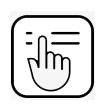
What adjustment disorder symptoms are you experiencing? From anxiety and fluctuations in appetite to trouble sleeping and reckless behavior, these are some of the signs that individuals may face after a stressful change.
Anxiety
Fluctuations in appetite
Trouble sleeping
Reckless behavior
Drug and alcohol usage
Hopelessness
Palpitations
Headaches or stomach aches
Withdrawal or isolation

Adjustment Disorder with Depressed Mood
This form typically emerges within three months of a stressor's onset, lasting up to six months. Causes range from chemical imbalances in the brain to hereditary factors and lifestyle stressors during childhood. Symptoms include:

Adjustment Disorder with Anxiety
A big life change will always be stressful, but sometimes that stress can linger and progress into anxiety. This anxiety may be focused around the life change, or may extend into unrelated areas of your life. Symptoms include:

Adjustment Disorder with Anxiety and Depression
A subjective form where anxiety and depression symptoms vary, sometimes presenting in equal amounts. Symptoms include anhedonia, increased tearfulness, and decreased self-esteem.
Sometimes anxiety and depression can co-occur, presenting at the same time and influencing each other. This type of adjustment disorder is often highly disruptive and requires mental health therapy.

Adjustment Disorder with Disturbance of Conduct
This type of Adjustment Disorder manifests in aggressive outbursts often directed at authority figures. However, this disturbance of conduct stems from fear of change. Symptoms include:

Adjustment Disorder with Mixed Disturbance of Emotions & Conduct
When you experience the emotional disturbances of anxiety and depression and the behavioral disturbances of conduct disorders, you might be experiencing this unique type of Adjustment Disorder. Other symptoms include:

Unspecified Adjustment Disorders
When reactions to stressors don't fit specific subtypes, it's categorized as unspecified, involving symptoms like social withdrawal and extreme mood swings.
Our team of expert Adjustment & Life Transition Therapists provides holistic care and support for your healing journey towards a quality life.


855-722-4422

“It is okay to have depression, it is okay to have anxiety, and it is okay to have an adjustment disorder. We need to improve the conversation. We all have mental health the same way we all have physical health.”

—Prince Harry
Our therapists creates an inclusive space for you to talk and find the right support system.

Find A Counselor

Check Your Insurance

Book Your Online/In-person Therapy Session

Match with a qualified therapist for personalized care, identifying causes fueling your adjustment disorder. and guiding you on the path to recovery.
Look into virtual therapy from home, receiving holistic support for overcoming stress and anxiety.
Speak with an Adjustment Disorder Therapist
Our Therapists | Insurance | Services Offered | Privacy
All our adjustment disorder counselors are highly educated and trained, possessing full clinical licensure in practicing counseling. We conduct thorough interviews, background checks, and in-house training for our therapists. Continuous education is ensured for each counselor to provide the best in-person and online therapy services.
Selecting the right adjustments and life transitions therapist is crucial. Detailed bios of our therapists are available for your review. If you have a specific therapist in mind, we're happy to schedule you with them. In cases of mismatches, we assist in finding the right fit or provide referrals.
A professional counselor, holding a master's or PhD level, is approved by state licensure boards to diagnose and treat mental health disorders. Common licenses include LMHC, LPC, LCPC, and LPCC.
Yes, we employ licensed clinical psychologists specializing in adjustment disorder. Psychologists offer unique services, such as online therapy and psychological testing, complementing the work of counselors.
Our adjustment disorder therapists accept major commercial insurance plans, including Aetna, Cigna, United Healthcare, Tricare, and others. If your insurance isn't listed, we'll verify benefits, and if needed, offer an affordable self-pay rate.
No, we operate without ongoing memberships or fees. We believe in providing the best therapy service experience free of ongoing out-of-pocket fees. Your session costs are determined by your insurance provider or our low self-pay rate.
We keep costs low by accepting most major insurance plans. The out-of-pocket expense for online adjustment disorder therapy sessions is often a low copay. We also offer a self-pay rate lower than many practices.
We prioritize hiring the best for your adjustment disorder therapy goals. If your experience falls short, we'll help you find someone you prefer.
Life transitions involve significant changes, planned or unexpected, affecting one's life. These changes may pose challenges, leading to adjustment disorder symptoms.
Adjusting to new routines and increased stress during life transitions can be challenging. Unanticipated changes add to the difficulty.
Adjustment disorder results from significant life changes, affecting coping processes. Symptoms, such as mood swings and trouble sleeping, typically manifest three months after a change or stressful event.
Symptoms vary but may include persistent sadness, worry, difficulty sleeping, and suicidal thoughts. Seeking a therapist can help navigate adjustment disorder or life transition challenges.
The signs and adjustment disorder symptoms experienced differ from person to person and depend on the type of adjustment disorder or level of transition. In response to a stressful situation, you suffer more stress than is often anticipated, and the stress causes serious issues in your life.
Adjustment disorders impact how you feel and think about the world and yourself, as well as your behaviors and behavior. Several instances include:
Various stressful situations can lead to adjustment disorders, including loss, relationship difficulties, significant life changes, health concerns, moving, financial issues, and family disputes.
Psychotherapy, lifestyle adjustments, and relapse prevention therapy are primary treatments for adjustment disorders.
Our therapists specialize in a wide range of mental health issues, including anxiety, depression, trauma, PTSD, couples counseling, life transitions, bipolar disorder, schizophrenia, eating disorders, and more.
The first session is focused on providing the service you seek and showcasing the therapy process's effectiveness with the right commitment from both sides.
Accessing an adjustment disorder specialist is quick and easy. Browse therapist bios online, find the right fit, and schedule a session. Alternatively, call our office for assistance.
For emergencies, call 911. While not a crisis center, we provide direct email and phone access to therapists for urgent matters, offering resources beyond online or offline therapy sessions.
When you schedule a session with your adjustment disorder therapist or counselor, our team will send you a confirmation email with the appointment date and time, along with a link to the virtual adjustments and life transitions therapy room. Click the link, log in a few minutes before your session, and your adjustment disorder specialists will meet you there.
Yes, all our therapists can provide the best online adjustments and life transitions therapy and adjustment disorder treatment services to our clients.
We utilize a HIPAA-compliant video counseling service integrated into our Electronic Health Records System for seamless online therapy sessions. Booking a session is straightforward—call our office or request a specific session time from our website, and a team member will assist you in booking with the best adjustment disorder therapist. We'll review insurance information and policies, confirming your session details via email.
Booking a session is easy and flexible. Call our office, and a team member will help you book with the best-fit adjustment disorder therapist. Alternatively, choose your ideal therapist from our website, select a session time, and we'll reach out to confirm your appointment details.
Our flexible cancellation policy allows you to cancel or reschedule any online therapy session by contacting our office or your adjustment disorder counselor at least 24 hours before the scheduled time at no cost.
Adjustment disorder treatment is a long-term process that can improve overall mental health. While there's no guaranteed "cure," therapy helps facilitate positive lifestyle changes and is associated with healthy adjustments to the brain and body.
We take the responsibility of maintaining your privacy seriously. Lifebulb is a covered entity under HIPAA guidelines, adhering to all rules and regulations. For privacy-related questions or recommendations, contact us at privacy@lifebulb.com.
At Lifebulb, our adjustments and life transitions therapists prioritize creating a positive workplace, ensuring they can provide the best counseling and therapy. This commitment allows your adjustment disorder counselor or therapist to deliver optimal treatment.
Our online sessions are conducted by therapists in private spaces, and our video platform is contained within our HIPAA-compliant Electronic Health Records system. This setup ensures your face, voice, and data are always private and protected.
Yes, Lifebulb is a covered entity under HIPAA guidelines, adhering to all rules and regulations. For inquiries about our privacy and security practices, contact us at privacy@lifebulb.com.
Look over our expansive list of carefully curated resources to learn about adjustment disorders.